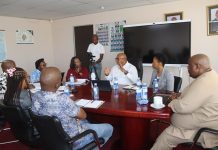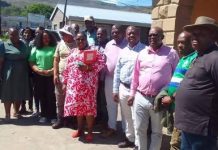Africa-Press – Lesotho. Speakers attending the ongoing High-Level Political Forum (HLPF) on Sustainable Development on Wednesday stressed the need for renewable sources to make up 60 percent of power generation by 2030 to support sustainable development in developing countries. The ongoing HLPF Wednesday was focusing on deliberating strategies for a smoother transition in the energy sector.
Delivering a keynote address on Goal 7 (affordable and clean energy) of the 17 Sustainable Development Goals (SDGs), Simon Stiell, executive secretary of the United Nations Framework Convention on Climate Change, noted that 80 percent of the energy used worldwide today is still derived from fossil fuels, the primary driver of climate change.
However, a zero-emission energy supply by mid-century is technically within reach. Wind and solar energy infrastructures are now cheaper to build than fossil-fuel power plants in 85 percent of the world, thus “fossil fuel subsidies have to end,” he affirmed.
Leonardo Souza of the statistics division in the UN Department of Economic and Social Affairs presented highlights from the special edition of the UN secretary-general’s report on progress towards the goals.
Reporting that close to 2 billion people will still rely on polluting fuels and technologies for cooking by 2030, he underscored that renewable sources accounted for 19 percent of global final energy consumption in 2020, two thirds of which consisted of modern renewable sources.
Also presenting highlights from the report, Armida Salsiah Alisjahbana, executive secretary of the Economic and Social Commission for Asia and the Pacific, pointed out that Latin America and the Caribbean’s annual investment in renewables of 1.3 percent of regional GDP over a decade “would create 7 million new green jobs.
”
In the first of two panels on “SDG 7 and interlinkages with other SDGs — Affordable and clean energy,” speakers highlighted the centrality of energy and a just transition in achieving the global goals, while also noting that many low-income and developing countries’ progress is impacted by multidimensional challenges.
Guangzhe Chen, vice president for infrastructure at the World Bank, noted that half of the population in the sub-Saharan African region still lives without electricity.
“This is denying a life transforming opportunity for these populations,” he said. The World Bank, with a current portfolio in energy projects of 10 billion U. S.
dollars, supported Nigeria’s electrification program, which transformed that country. Accelerating the pace of global electrification will require a fundamental shift in the way energy access is conceived.
Reporting on the digital domain, Shahla Naimi, senior program manager of Google, noted that a transformation in line with its Digital Sprinters framework could generate as much as 3.4 trillion dollars in emerging markets by 2030.
However, these markets will never reach their economic objectives if women are systematically excluded, as nearly 1 billion women and other marginalized groups still do not even have a bank account.
In Africa, she noted Google’s Equiano subsea cable is expected to increase Internet speed in Nigeria fivefold and triple it in South Africa, perhaps indirectly creating 1.6 million jobs in those countries over the next four years.
Adding to that was Sabrina Atwine, CEO of Nimarungi and a young entrepreneur from Uganda, who described growing up in a slum area where she experienced first-hand a lack of resources and opportunities for children. Uganda has the second youngest population globally, but they lack access to quality education.
Africa is home to 1.3 billion people, possesses 60 percent of the world’s arable land, and holds 30 percent of the world’s reserve minerals, yet contributes only 3 percent of GDP and generates a mere 0.1 percent of all patents.
“As a young African tech entrepreneur, I’m working so hard to see these numbers change,” she stated.
Convened under the theme “Accelerating the recovery from the coronavirus disease and the full implementation of the 2030 Agenda for Sustainable Development at all levels,” the forum — which runs until July 19 — will explore policies and transformations needed to overcome the multiple crises that continue to threaten decades of progress made in development around the world.
Particular emphasis will be placed on trends and policies related to SDG 6 (clean water and sanitation); Goal 7; Goal 9; Goal 11 (sustainable cities and communities); and Goal 17 (partnerships for the Goals and their linkages to other goals).
For More News And Analysis About Lesotho Follow Africa-Press






